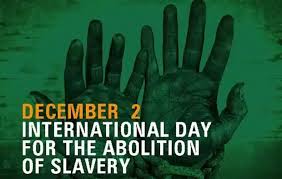International Day for the Abolition of Slavery 2024
Introduction to International Day for the Abolition of Slavery
International Day for the Abolition of Slavery is observed every year on December 2 to raise awareness about the need to end slavery in all its forms. The day serves as a reminder of the ongoing struggle to abolish modern slavery, human trafficking, and exploitation, even though slavery was officially abolished centuries ago. This important day calls on governments, organizations, and individuals to take action to eliminate all forms of slavery, including forced labor, child labor, and trafficking.
The History and Significance of December 2
The date, December 2, was chosen to honor the United Nations General Assembly’s adoption of the abolition of slavery. In 1949, the UN Convention for the Suppression of the Traffic in Persons and of the Exploitation of the Prostitution of Others was signed, emphasizing the global community’s commitment to eradicate slavery. Since then, December 2 has been marked to honor the victims of slavery and to continue pushing for legislative and societal changes to prevent its resurgence.
Global Efforts to Combat Slavery
Across the world, governments, non-governmental organizations (NGOs), and activists work tirelessly to combat human trafficking and modern-day slavery. In many parts of the world, human trafficking, forced labor, and sex trafficking are still prevalent, with millions of people being affected by these crimes. Efforts such as awareness campaigns, stronger laws, victim rehabilitation, and international cooperation are critical in the fight against slavery.
Challenges to Eradicating Slavery
Despite global efforts, slavery still exists in various forms, often hidden from public view. Forced labor, child labor, and human trafficking are particularly prevalent in industries such as agriculture, mining, and domestic work. The challenges to eradicating slavery include insufficient laws, corruption, lack of enforcement, and widespread poverty, which makes individuals vulnerable to exploitation. Furthermore, many victims are unaware of their rights or fear retaliation if they try to escape their conditions.

Why this News is Important
Raising Awareness About Modern Slavery
The observance of the International Day for the Abolition of Slavery plays a pivotal role in raising awareness about the ongoing issue of modern slavery. Despite global progress in human rights, millions of individuals are still enslaved in various parts of the world. This day serves as a platform to inform the public and highlight the importance of eradicating these injustices through education and awareness.
Global Commitment to Abolition
The day marks the global community’s commitment to the abolition of slavery and the importance of collective action. It highlights how international organizations, governments, and local communities must unite to eliminate slavery. The continued observance of this day emphasizes the necessity of a collaborative approach to eradicate exploitation, trafficking, and forced labor from all corners of the world.
Educational Purpose for Government Exams
For students preparing for government exams, understanding key international observances such as the International Day for the Abolition of Slavery is crucial. These topics often feature in exams related to current affairs, general knowledge, and international relations. The history and significance of the day also offer insights into global human rights issues, which are important in understanding international policies and conventions.
Historical Context
The History of Slavery and Its Abolition
Slavery has existed for centuries in various forms, from ancient civilizations to the transatlantic slave trade in the 16th to 19th centuries. The abolition movement gained momentum in the 18th century, particularly in Europe and the Americas. The movement’s successes culminated in the formal abolition of slavery in several countries, with the United States’ Emancipation Proclamation in 1863 being a significant milestone.
The Role of the United Nations
In the 20th century, the international community, led by the United Nations (UN), took strong stances against slavery. The 1948 Universal Declaration of Human Rights explicitly condemned slavery, and in 1949, the UN adopted the Convention for the Suppression of the Traffic in Persons, marking a significant step toward a global commitment to abolishing slavery and human trafficking.
Key Takeaways from International Day for the Abolition of Slavery
| Serial Number | Key Takeaway |
|---|---|
| 1 | Observance Date: International Day for the Abolition of Slavery is observed annually on December 2 to raise awareness about modern slavery. |
| 2 | Historical Significance: The day commemorates the United Nations’ adoption of the 1949 Convention for the Suppression of the Traffic in Persons. |
| 3 | Global Efforts: The day highlights the collective actions of governments and NGOs to combat human trafficking, forced labor, and exploitation. |
| 4 | Ongoing Challenges: Modern slavery still exists, with millions of people, especially in industries like agriculture and mining, being exploited. |
| 5 | Importance for Students: Knowledge of this day is critical for students preparing for government exams as it relates to human rights and international law. |
Important FAQs for Students from this News
What is the International Day for the Abolition of Slavery?
The International Day for the Abolition of Slavery is observed on December 2 each year to raise awareness about modern slavery and encourage global efforts to eradicate it. This day emphasizes the need to end human trafficking, forced labor, and exploitation.
Why is December 2 chosen for the International Day for the Abolition of Slavery?
December 2 was chosen to commemorate the adoption of the United Nations’ Convention for the Suppression of the Traffic in Persons in 1949, a significant step in the global fight against slavery.
What forms of slavery still exist today?
Modern slavery includes human trafficking, forced labor, child labor, and sexual exploitation. It is prevalent in industries such as agriculture, construction, and domestic work.
How does the International Day for the Abolition of Slavery contribute to ending modern slavery?
The day raises awareness about modern slavery, highlights the importance of international cooperation, and promotes efforts to create stronger laws, provide victim rehabilitation, and foster a culture of human rights and dignity.
How is this day relevant to students preparing for government exams?
The observance of this day is important for students preparing for competitive exams, especially in areas like human rights, international relations, and general knowledge. Knowledge of this day and its historical context can be beneficial in answering current affairs and international law-related questions.
Some Important Current Affairs Links

















